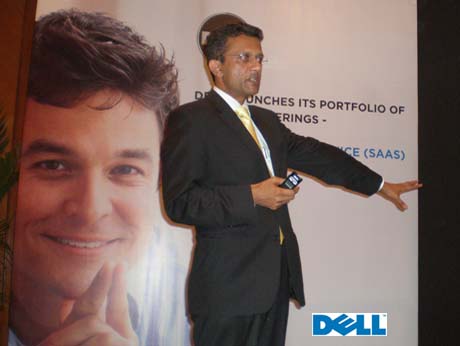
Entry level modules in India could be as low as $ 20 / Rs 1000 a month per seat.
Following its September 2009 , 4 billion dollar acquisition of managed IT services leader Perot Systems, Dell, hitherto a significant player on the systems side of the computer business, has began widening its appeal for customers in the Software as a Service arena. This week, it announced a broad based line-up of such services in India – with one foot in the clouds and another on physical systems in terra firma – even if that sounds anatomically impossible.
“We are already number one in virtualisation, in x86-based PCs and workstations and in providing cloud infrastructure”, Dell India’s Country Manager Sameer Garde reminds, suggesting that for such a company to offer a slate of on-demand software services, and the option of shifting part of a company’s information assets to the Web , is only natural evolution.
Companies typically spend 80 percent of their annual IT spend on just ‘ keeping the lights on’ - that is, maintaining legacy systems, Garde adds and promises the Dell way will bring this down to 50 percent. IT enabled services aree almost 50 percent labour-based, again something that Dell believes is a skew it would like a chance to correct.
He is ready to admit that for a $ 53 billion player like Dell, services is still a small part of the IT cake -- around $ 7 billion worth even if one factors in the Perot business.
Dell’s Cloud/SaaS offering details:
Dell’s new cloud-optimized SaaS platform offers configurable, flexible options with minimal upfront costs for customers and channel partners to quickly deploy just the applications and managed services they need to achieve superior IT business impact. These secure services automate common system management, remote monitoring and business continuity functions to reduce the cost and complexity of managing IT infrastructure, and are specifically designed to address today’s ever increasing challenges with mobility, distributed organizations, security, compliance and disaster preparedness.
Dell is announcing a broad portfolio of new SaaS applications across three key IT infrastructure management areas:
Client Device Management where Dell’s SaaS applications will help customers streamline the most time-consuming, labor-intensive tasks no matter where the PC clients are located on the Internet and without a dedicated VPN. Such applications and services include:Distributed Device Management (Asset Management, Patch Management, Software Distribution and Anti-Malware & Virus Management); Laptop Data Encryption; Online-Backup & Restore; Software Inventory & Usage Management
Remote Infrastructure Monitoring –designed for customers that want to manage critical distributed IT systems, such as servers, applications, storage and network devices located in branch offices. Remote Infrastructure Monitoring applications and services include: Fault and Performance Monitoring; Patch Management; Vulnerability Scanning and Reporting
Continuity and Compliance Management – to enhance business continuity, disaster recovery, and regulatory compliance by leveraging a global datacenter network to improve crisis communication, protect email from downtime and provide long-term message archiving. Applications and services include:Email Continuity, Archive and Security;Emergency Notification and Incident Collaboration.
Dell executives suggested that in India the SaaS offerings would be modulur mix-n-match with entry levels as low as $ 20 ( Rs 1000) a seat, a month.
Abhilash D.B. of AMI Partners feels that market as far as the Indian market conditions are concerned, this is the right time to offer such services to ease infrastructure management leveraging the cloud. Factors that can trigger this model include companies looking for optimizing resources and reducing capital expenditure and in this scenario Dell’s modular services model will get a better traction in the market. Secondly, since companies are finding it difficult to find skilled manpower for IT ventures, this model will be great help to companies who do not have mature IT teams and skilled manpower.